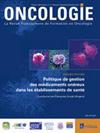Immunotherapy in hepatocellular carcinoma: an overview of immune checkpoint inhibitors, drug resistance, and adverse effects
IF 2.5
4区 医学
Q4 ONCOLOGY
引用次数: 0
Abstract
Abstract Hepatocellular carcinoma (HCC) is a concerning liver cancer with rising incidence and mortality rates worldwide. The effectiveness of traditional therapies in managing advanced HCC is limited, necessitating the development of new therapeutic strategies. Immune checkpoint inhibitors (ICIs) have emerged as a promising strategy for HCC management. By preventing tumor cells from evading immune surveillance through immunological checkpoints, ICIs can restore the immune system’s ability to target and eliminate tumors. While ICIs show promise in enhancing the immune response against malignancies, challenges such as drug resistance and adverse reactions hinder their efficacy. To address these challenges, developing individualized ICI treatment strategies is critical. Combining targeted therapy and immunotherapy holds the potential for comprehensive therapeutic effects. Additionally, biomarker-based individualized ICI treatment strategies offer promise in predicting treatment response and guiding personalized patient care. Future research should explore emerging ICI treatment methods to optimize HCC immunotherapy. This review provides an overview of ICIs as a new treatment for HCC, demonstrating some success in promoting the tumor immune response. However, drug resistance and adverse reactions remain important considerations that must be addressed. As tailored treatment plans evolve, the prospect of immunotherapy for HCC is expected to grow, offering new opportunities for improved patient outcomes.肝细胞癌的免疫疗法:免疫检查点抑制剂、耐药性和不良反应概述
摘要 肝细胞癌(HCC)是一种令人担忧的肝癌,其发病率和死亡率在全球不断上升。传统疗法对晚期肝细胞癌的治疗效果有限,因此有必要开发新的治疗策略。免疫检查点抑制剂(ICIs)已成为一种很有前景的HCC治疗策略。通过免疫检查点阻止肿瘤细胞逃避免疫监视,ICIs 可以恢复免疫系统靶向和消灭肿瘤的能力。虽然 ICIs 有望增强针对恶性肿瘤的免疫反应,但耐药性和不良反应等挑战阻碍了 ICIs 的疗效。为了应对这些挑战,制定个体化的 ICI 治疗策略至关重要。将靶向治疗与免疫治疗相结合,有可能产生全面的治疗效果。此外,基于生物标志物的个体化 ICI 治疗策略有望预测治疗反应并指导个性化的患者护理。未来的研究应探索新兴的 ICI 治疗方法,以优化 HCC 免疫疗法。本综述概述了作为 HCC 新疗法的 ICIs,其在促进肿瘤免疫反应方面取得了一些成功。然而,耐药性和不良反应仍是必须解决的重要问题。随着量身定制的治疗方案不断发展,HCC 免疫疗法的前景有望扩大,为改善患者预后提供了新的机遇。
本文章由计算机程序翻译,如有差异,请以英文原文为准。
求助全文
约1分钟内获得全文
求助全文
来源期刊

Oncologie
医学-肿瘤学
CiteScore
1.30
自引率
11.10%
发文量
32
审稿时长
6-12 weeks
期刊介绍:
Oncologie is aimed to the publication of high quality original research articles, review papers, case report, etc. with an active interest in vivo or vitro study of cancer biology. Study relating to the pathology, diagnosis, and advanced treatment of all types of cancers, as well as research from any of the disciplines related to this field of interest. The journal has English and French bilingual publication.
 求助内容:
求助内容: 应助结果提醒方式:
应助结果提醒方式:


